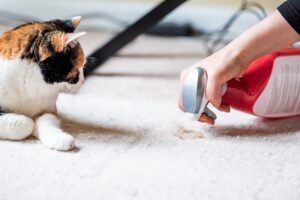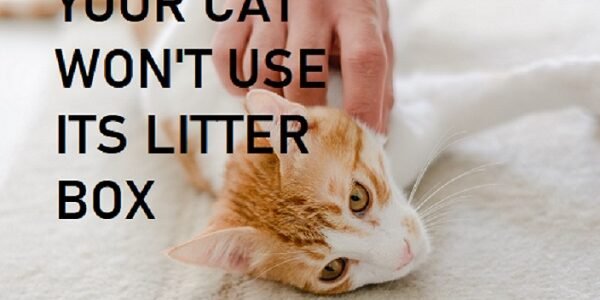Is your cat suddenly peeing outside its litter box? This problem causes much angst for cat owners and their pets! Understanding cat behaviour as to why your cat won’t use litter box can be complex. In this guide we look at the root cause of the problem and make suggestions on how to resolve the behavior.
Litter box evasion can occur in the following two ways:
- Your new cat or kitten simply refuses to use the litter box you provide.
- Your cat suddenly stops using the litter box.
Cats are very choosy in their habits, and even very young kittens will make an attempt to use a designated litter box rather than pee on the floor or furniture.
When you discover that your cat has had an ‘accident’, it’s important that you refrain from punishing him/her – harsh words or reprimands will not persuade your companion to return to the box!
Rather, you need to determine why your cat is eliminating inappropriately. Identify the root cause of the problem.
Understanding the Reasons Why Your Cat Won’t Use Litter Box
 The first thing to do if your cat starts evading the litter box is to organise a visit to your veterinarian. There could be factors such as a bladder infection, bladder stones, urinary infection, Interstitial Cystitis, diabetes or constipation that may well be causing the problem.
The first thing to do if your cat starts evading the litter box is to organise a visit to your veterinarian. There could be factors such as a bladder infection, bladder stones, urinary infection, Interstitial Cystitis, diabetes or constipation that may well be causing the problem.
However, if your cat is healthy, there are other reasons why your cat is suddenly avoiding the litter box.
A Key Reason
Cats are super clean animals. One factor that can drive a cat from their litter box is a box that is filthy. Put yourself in your pet’s situation and imagine how you would feel having to use an overflowing toilet! You wouldn’t, so why would a cat. Today’s busy world frequently leaves us trying to do too much in too little time; however, the litter box cannot be neglected.
In many cases cats will avoid using a dirty box. Cleaning the box regularly will often solve the problem. Too many cats using the same box contribute to this problem.
6 More Reasons Your Cat Won’t Use Litter Box
- Relocating the litter box to a new spot in the house can cause confusion. Cats are creatures of habit, and moving the box to a place that might be convenient to you can result in soiling inappropriately.
- Using a new kind of litter may upset your cat. Your cat may decide that he/she does not like the new smell or texture of the new product. Cats have delicate noses and scented litters may be too strong for your cat.
- While mechanized, self-cleaning litter boxes do save owners effort and will keep the box cleaner; however, many cats are spooked by the noise these boxes produce, and may take some time to get comfortable with them.
- The litter box needs to be the correct size. Boxes that are too small can make the cat uncomfortable.
- Hooded litter boxes do keep the home looking better and the floor tidier, but some cats are fearful of entering a dark place. Litter box liners may also cause a problem.
- Intact adult cats mark their territory by spraying with urine. This is especially evident with toms. Neutering the cat will help solve to problem of litter box avoidance.
Getting your cat back on track and utilizing their litter box may take some problem solving and require time, but generally a solution can be found that will work for both you and your pet.
Tips to Introducing a Litter Box to Your Cat or Kitten for the First Time
The following suggestions are for people introducing a new cat or kitten to the home and then training them to use a litter box for the first time.
- In a natural state, cats seek dry, loose soil in which to urinate and defecate. If you provide a litter that imitates this, you will likely have your cat using the box without any issues. Not all cats take too well to scented litter. It is best to stick with an unscented brand at least until your cat gets familiar with its box.
- Keep the litter box clean. Remove sullied litter daily- the sooner the better. All the litter in the box should be changed entirely once a week and the litter pan washed.
- It is best that pet owners with more than one cat, provide a litter box for each of them. In most cases cats are not fond of sharing the box with other cats.
- Select a location that the cat likes to use for toileting. Preferably locate the litter box away from where the cat eats and drinks. Most cats like privacy, so placing the box in a more out-of-the-way spot will encourage use.
- Should your cat be resisting using the litter box, try confining him/her in a small room with the box available. Most often, the cat will get the idea and start making use of the box.
- Kittens can be easily trained to start using a litter box by using an attractant in the box. Do this until they become comfortable with using it.
Cleaning Up After Accidents
 There is no mistaking the heavy, ammonia odor of cat urine. Whether your cat is just urinating wherever he/she wishes, or is marking its territory by spraying, the result will be the same- a strong odor that will affect a surprisingly large area of the house.
There is no mistaking the heavy, ammonia odor of cat urine. Whether your cat is just urinating wherever he/she wishes, or is marking its territory by spraying, the result will be the same- a strong odor that will affect a surprisingly large area of the house.
Urine smell on hard surfaces can be difficult to get rid of. Getting the smell out of fabric can be much worse.
Cats have been known, not only to defecate behind furniture to hide the deed, but they will seek out places such as the bed!
You may have read that soap and water or baking soda will eliminate cat urine odor, they won’t!
Several of the organic compounds in cat urine are not water soluble, thus requiring an enzyme cleaner to remove the smell entirely. One such compound is uric acid. Not only is it non-soluble, but it is also capable of binding to adjacent surfaces.
The process of using an enzyme cleaner may need to be repeated several times until all the odor is gone.
Your nose will let you know when the job is done!
Cat Urine Odor, Removal Tips
Once you locate the problem area, it is important to remove the urine as completely as possible; not only for the sake of your nose, but to discourage your cat thinking that this particular spot is now the new bathroom.
When you find fresh urine, you should:
- Wipe urine from hard surfaces with a paper towel (if you use a cloth, you’ll need to throw it away after cleaning up). Use the same to blot urine soaked in furniture or rugs.
- An enzyme cleaner is your best choice. These cleaners are specifically made to break down the uric acid contained in cat’s urine, into ammonia and carbon dioxide. These compounds will simply off gas naturally afterwards.
- Don’t rush the drying process after using an enzyme cleaner. Hasting the process will interrupt the normal dissipation of the ammonia and carbon dioxide.
- Use the best enzyme cleaner available – inexpensive cleaners, often, require multiple uses before they rid the odor of cat urine.
- Be plentiful when applying the cleaner. Soak the target area to allow the enzymes to go to work.
- Leave the cleaner on for about 15 minutes, blot it up, then let the spot dry naturally.
Although rugs are the usual areas where cats may urinate; beds, sofas, and clothing can also be soiled. The same procedure can be used in all cases. After treatment with the enzyme cleaner, slipcovers and clothing should be washed separately.
With cats that spray in the home you’ll find their markings on vertical surfaces such as door fames or chair legs.
Best Cat Litter to Buy
Clumping litter is the best choice for the litter box. Not only does this kind of material make it easier to remove excrement, but it also makes it easy to remove urine. Use a scoop to take out the clumps twice a day. Better still, if you are home, scoop the box as soon as your cat is finished. Remember to add fresh litter to compensate for what was removed.
Avoid scented cat litter, at least to start with. The smell may be overpowering for your cat causing it to avoid the box.
Final Thoughts
Cat behavior is complex, and the challenges with litter box use and the solutions we’ve presented above only scratch the surface of the justifications and modifications for why your cat won’t use litter box.
The most important aspect is to first eliminate medical problems. After this is done a common-sense approach, looking at the root cause of the problem will have your cat and you feeling content once again.
We have only provided a simple guide. For a comprehensive understanding, we refer you to the ‘Cat Spraying No More’ program. Not only does this excellent guide specifically diagnose the root cause of your cat’s inappropriate toileting, put it gives you a specific procedure to follow.
CLICK HERE to view the ‘Cat Spraying No More’ program.




